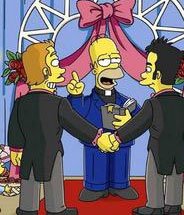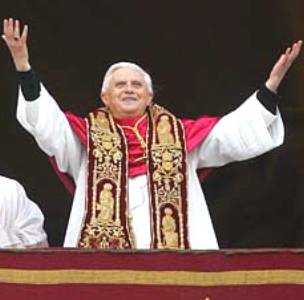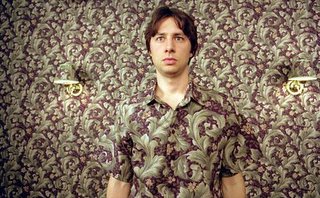
Christmas 2005 is going to be extra festive, extra gay if you will, for a good deal of people across the United Kingdom. In three weeks time, the Civil Partnerships Bill will come into effect in the UK which means same-sex couples will be able to enter into civil unions.
This Bill will allow for access to spousal-like benefits such as pensions, next-of-kin status and an exemption on paying inheritance tax. The same alimony and child support responsibilities in the event of separation will also be a feature of the Bill. The union will not be a 'marriage' per se - but will assume many of the rights attributable to the institution.
The news has been largely hailed as a positive move by gay rights groups. Two of the UK's most prominent gay publications - Gay Times and Attitude - have both devoted their December editions to the topic, covering everything from gay honeymoon packages to gay wedding planners! Ireland's Gay Community News (GCN) devoted its cover to Gráinne Close and Shannon Sickels, who will be married in Belfast when the law comes into effect.
Elton John and his partner David Furnish will be among the first to sign the register on December 21st - reportedly in the same place as Prince Charles and Camilla Parker Bowles did in April of this year!
It is a huge step forward and the endlessly beleaguered Blair government should be commended for getting the Bill through parliament.
A civil arrangement is what many gay activists are seeking in this country. It's a long way off by the sounds of things.
Minister for Justice Michael McDowell was the controversial choice to launch this years' Look Out! Dublin Lesbian and Gay Film Festival at which he spoke at length on the government's commitment to introducing legislation for "co-habiting couples...some of which will resemble some of the incidents of marriage in law but in other respects differ substantially from marriage".
This years' festival was an expressly political one: its stated theme was 'Family Values' amd it choose screenings that portrayed the family - both real and imagined ones - in all their complexity.
In his speech at the festival, McDowell stated and I quote him at length here:
"I note that many of this year's films focus on the theme of family values and I know that the issue of legal recognition of same sex partnerships is of immediate concern to you. I have previously acknowledged, on behalf of the Government, during the debate on Senator David Norris' Civil Partnership Bill that the position of same sex couples before the law, and others in caring relationships, including extending State recognition to civil partnerships between such persons, needs to be addressed. There are a number of factors which will inform future decisions on this issue. Those factors include the Report of the Law Reform Commission on Rights and Duties of Cohabitants, the Report of the All Party Oireachtas Committee on the Constitution of its examination of the Articles relating to the family and the outcome of current litigation regarding the recognition of a foreign same-sex marriage".
It is believed that the forthcoming Joint Oireachtas Committee on the Constitution will not be advocating that the definition of 'the family' be sufficiently widened so as to allow for civil unions in the Republic. So that's that option out. Where does that leave us? Nowhere?
The areas covered by the British legislation - which McDowell deemed extraordinarily complex but yet seemed to get through pretty quickly - will need "careful study and realistic, sustainable responses" in the Irish context.
I'd like to draw your attention to one recent event that serves as an interesting frame for the whole question of civil arrangements in Ireland.
It's coming up to the first anniversary of the civil ceremony of Bernadette Coleman and Patrick Dunne. Who are they, you ask? Patrick and Bernadette were the winners of Dublin 98FM’s ‘Two Strangers and a Wedding’ competition. Bernadette and Patrick met at the altar for the first time on December 3rd of last year. Two complete strangers married as a result of a cash offering by the radio station and enjoyed a lavish ceremony at Clontarf Castle costing €63,000. This was a turn of events that should turn the stomach of every gay and lesbian person in Ireland.
It should also have rankled the forces who are out to protect marriage from the apparent degradation that same sex couples are seeking to bring to the revered institution (no offence guys, but I think heterosexuals are doing a pretty good job of undermining marriage themselves).
All of those commentators who oppose gay marriage – from pressure groups, the media and the political establishment – should have been up in arms over this blatant disregard for and cheapening of the institution.
A gay couple that have been in a meaningful, loving, deep-rooted relationship, perhaps for years or even decades, will have to drag their private life through the courts, at their own expense, in order to receive the legal and formal entitlements that were so frivolously granted to two complete strangers, who married, essentially, on the basis of a blind date.
Without even knowing each others' favourite colour or their middle names, this couple can completely exploit a legal avenue that a loving gay couple, such as Drs. Katherine Zappone and Ann Louise Gilligan have to fight in the courts over to achieve recognition of their Canadian same sex marriage by the Irish State and the Irish Revenue Commissioners.
Most gay men and women in Ireland realistically acknowledge that full-blown gay marriage is a battle that just cannot be won, not at this point anyway. Judging by the mute reaction to 98FM’s prize, law-makers and the Irish public should have no problem with allowing gay people to formalise their relationships with a civil ceremony.
Afterall, if two total strangers can just avail of the option, with no regard for the subsequent taxation and legal consequences, and all to zero public outrage or consternation, what’s the hold-up with granting that right to a committed gay couple?
Ah but there’s the rub. What this points to, perhaps, is the homophobia that is still subterraneous in our ‘post-gay’, pseudo-liberal society. (Before I continue: I'm not saying that the partnership between Bernadette and Patrick will fail, nor do I hope it does. If two people can find love, then good luck to them. If you by chance know them, let us know how they're doing!).
But everyone must realise how offensive it is to the gay community to see the one thing that they are striving to achieve being so taken for granted by a couple, all in the name of ratings, publicity and cheap sensationalism. The fact that this case did not provoke any indignant responses in defence of civil institutions shows that, deep down, people don’t really consider the ramifications for the tax and legal systems, not to mention the family and the institution of marriage itself, when a heterosexual couple (and do they even deserve that title considering that they didn’t even know each other beforehand?) avail of a civil union.
It’s when you substitute ‘straight’ for ‘gay’ in that equation that the some people shake themselves into public remonstration. If those who have appointed themselves as the ones to protect the basic tenets of society from exploitation are to do their job, then perhaps they should widen their gaze to include heterosexuals too. Otherwise, depriving civil union rights to gay people is nothing more than homophobia, pure and simple.
May I wish all those availing of the new law in the UK all the luck in the world for the future. If you're really smart, you'll synchronise your registering at the same time as Elton. You might even get a song out of him. As for achieving similar rights in Ireland, it sounds like we'll have to sing for that too.










